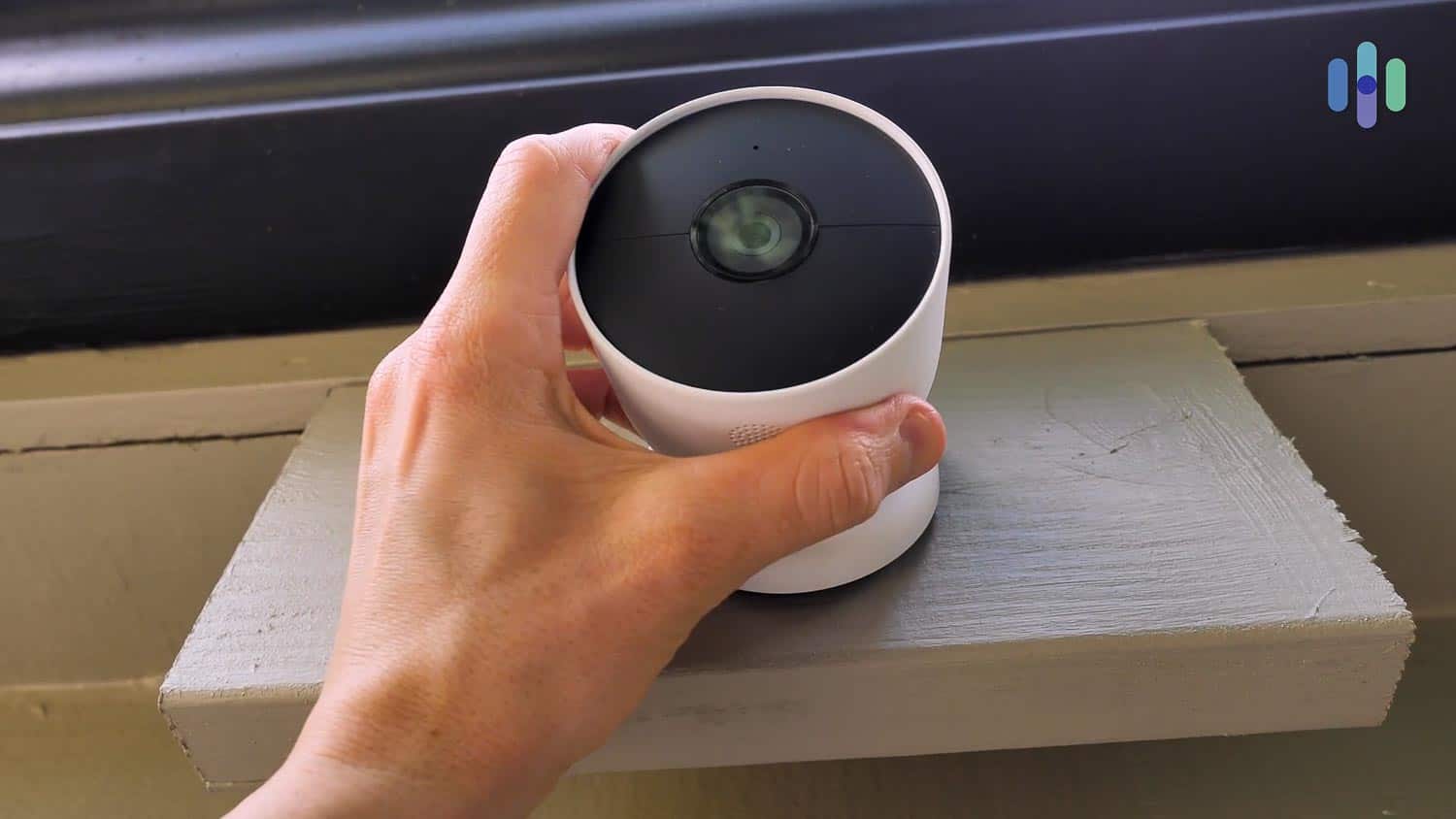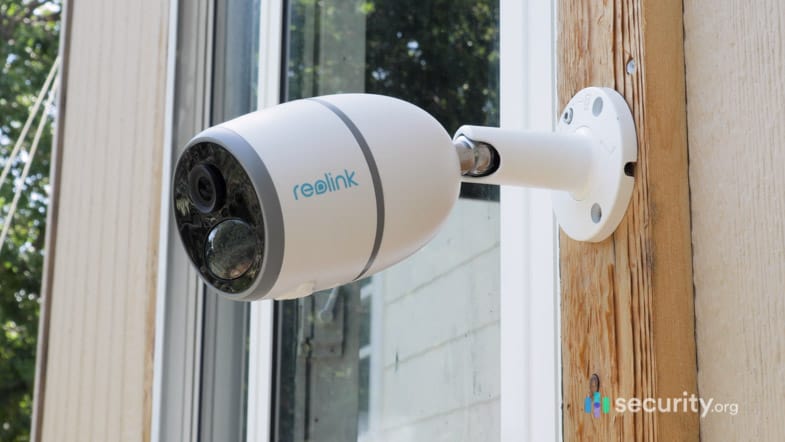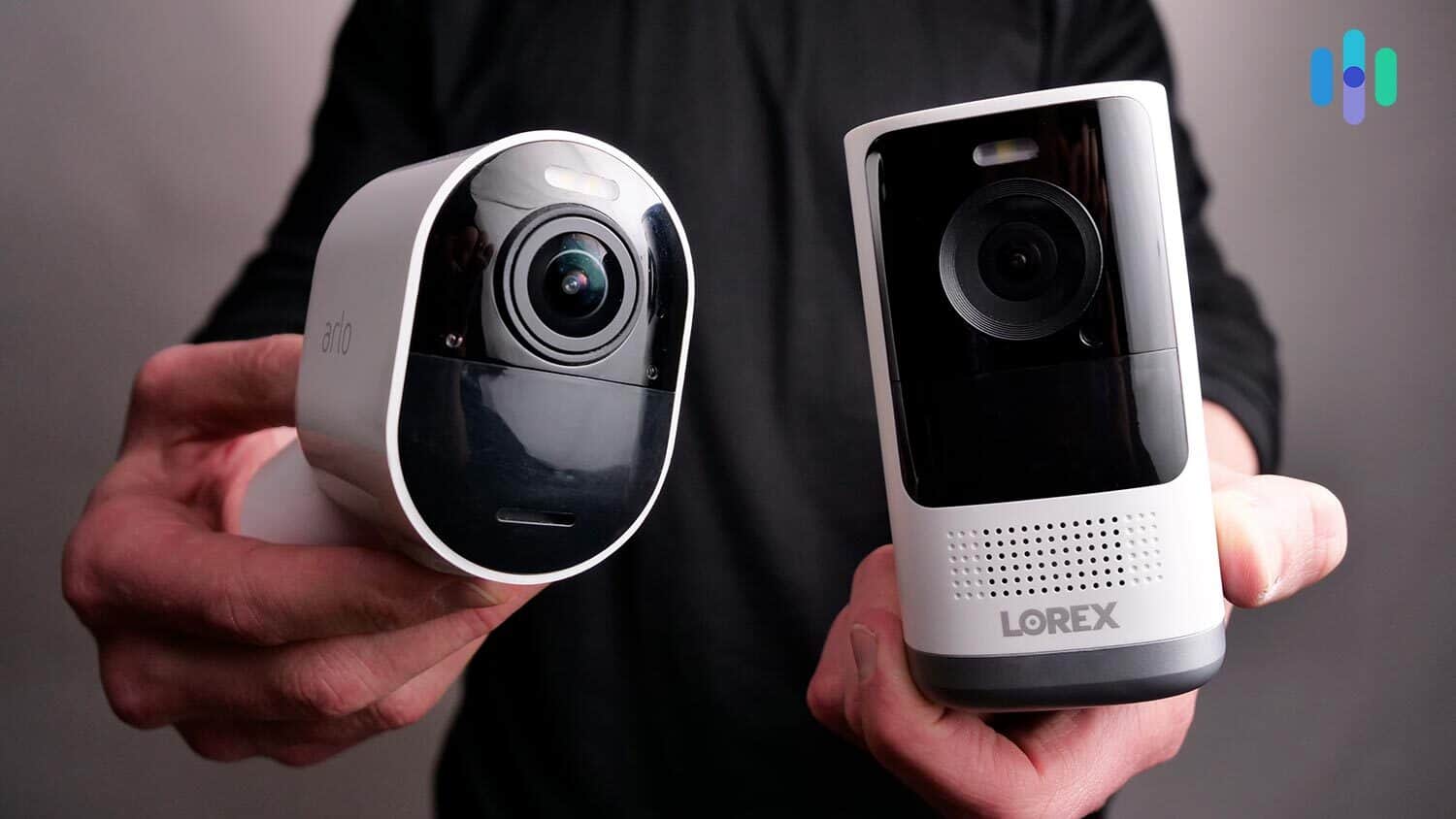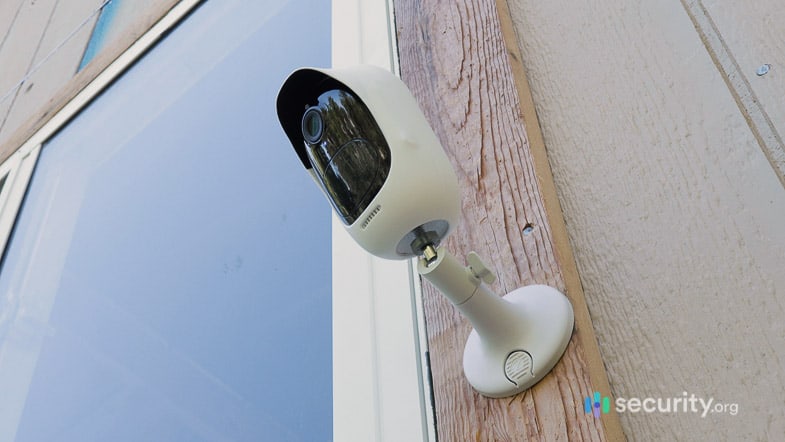Editor’s Note: We recommend using cameras as part of a home security system. But you’ll get better home protection with a SimpliSafe security system. Right now, SimpliSafe is offering a free security camera with every new system purchase.
We know that with their ability to detect movement and record videos, security cameras can help catch criminals. We’ve pretty much confirmed that with our break-in simulations – a part of our security camera testing process.
That said, when it comes to keeping your home safe, prevention beats detection every time. You want to stop crime before it happens, not just capture it on video. This raises the question: Are security cameras as effective at scaring off criminals as they are at recording them?
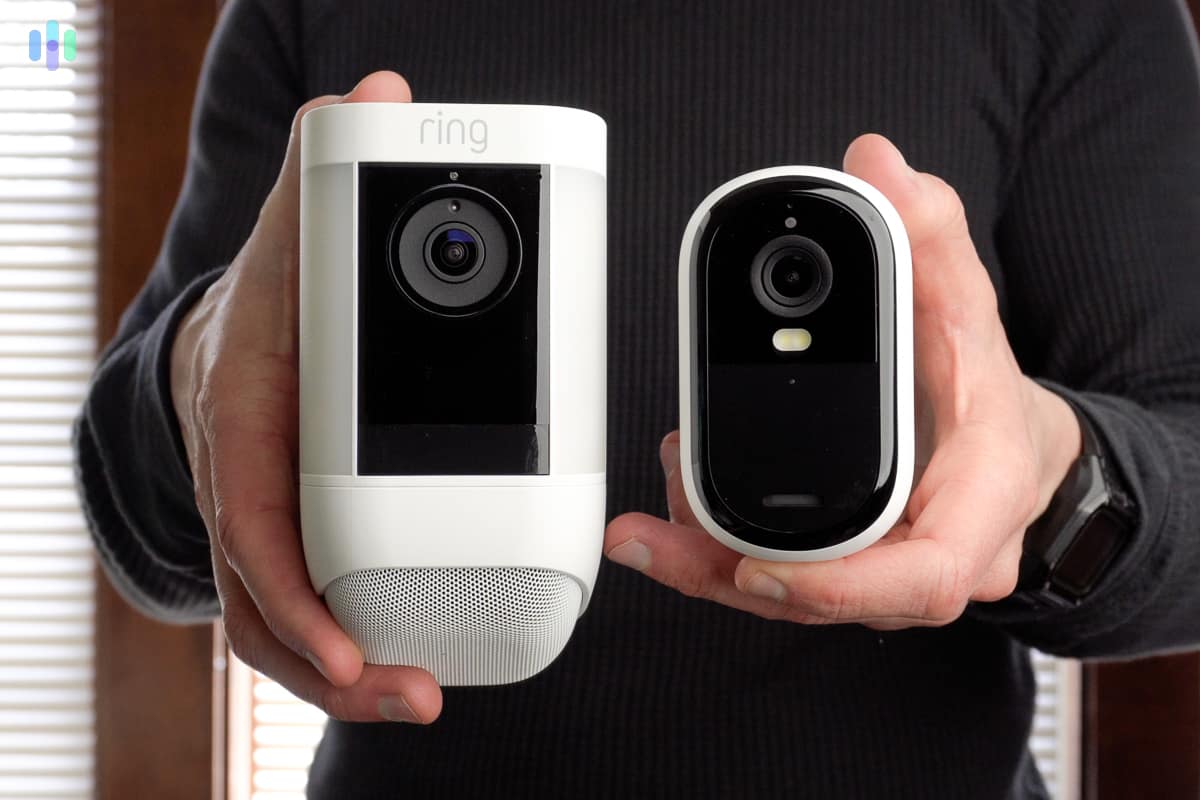
Do Security Cameras Deter Crime?
To give it to you straight, no security camera stops criminals 100 percent of the time. If they did, we wouldn’t have countless “porch pirate caught on camera” videos flooding social media every holiday season.
Research on camera effectiveness is mixed, with studies showing both strong deterrent effects and minimal impact. The truth? It depends on how you use them. Let’s dig into what the evidence actually tells us.
The Case For Cameras
- KTVB7: A local television station in Oregon interviewed 86 inmates currently serving time for burglary and found that most of them would leave immediately if an alarm went off or if they saw security cameras on the property. However, in that same study, a few of the inmates said that they see security alarms and cameras as an indication that there are valuables inside.1
- Municipal Technical Advisory Service: A comprehensive look at multiple academic studies found that yes, CCTV cameras are effective in deterring crime. However, they’re more effective when paired with other elements like lighting2 (we’ll talk more about how to boost the effectiveness of your security cameras in a bit).
- UNC Department of Criminal Justice & Criminology: Similar to the KTVB7 study above, the UNC Department of Criminal Justice & Criminology surveyed 422 burglars and found that half of them considered outdoor security cameras as effective deterrents.3
| Deterrence Measure Effectiveness | Overall % (rounded to nearest whole number) |
|---|---|
| Police nearby | 64% |
| Indications of alarms | 53% |
| Outdoor cameras | 50% |
| Outdoor lighting | 16% |
| Neighborhood watch | 13% |
| Security sign | 25% |
- Rutgers University School of Criminal Justice: A study of the nearby city Newark, New Jersey showed that residential burglar alarm systems decrease crime at homes and in the city overall. While many people believe that security cameras merely displace crime to other houses, the Rutgers study showed that they make entire neighborhoods safer. “Neighborhoods in which burglar alarms were densely installed have fewer incidents of residential burglaries than the neighborhoods with fewer burglar alarms,” said the study.4
- FBI Uniform Crime Reporting: Another myth about security cameras is that their cost outweighs their benefits. But here’s the math: The most affordable security cameras can cost as little as $30 like the latest Wyze Cam models, while the FBI reports the average burglary loss is $2,661 in 2023.5 That’s a return on investment worth considering.
- Urban Institute: A comprehensive study from the Urban Institute placed cameras in Baltimore, Chicago, and Washington, D.C. In Baltimore’s downtown district, 500 cameras contributed to a reduction of approximately 30 incidents per month, with minimal crime displacement to nearby areas. Chicago’s network of over 8,000 cameras correlated with an estimated 12 percent reduction in crime rates.6 However, the results weren’t universally positive, which brings us to the limitations…
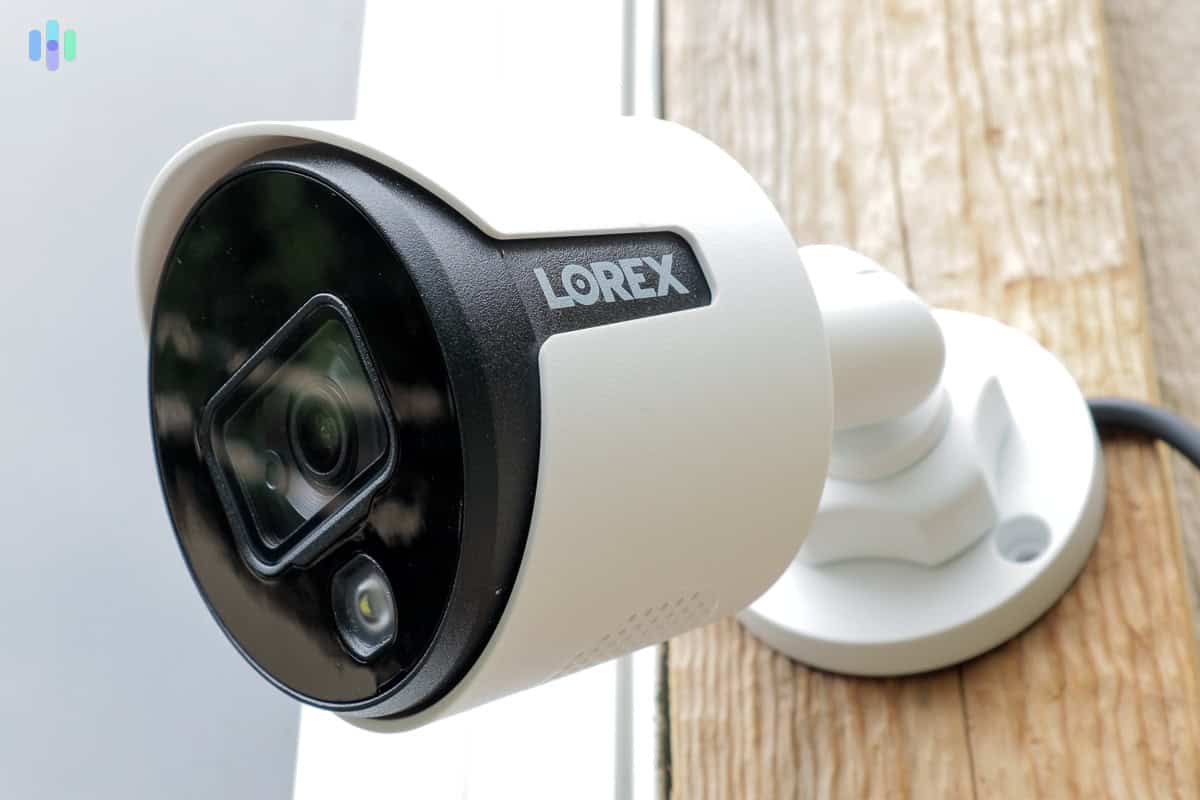
The Case Against Cameras
- Queen’s University: While functioning security cameras have proven deterrent effects, that’s the key word – functioning. Queen’s University Surveillance Studies Centre documented technical failures that prevented camera footage from being useful in investigations.7 Though this data is older, modern smart cameras still face issues that can render them ineffective when you need them most.
- Lincoln Police Department: Not all security cameras have been shown to deter crime. For example, cameras placed in a downtown bar street in Lincoln, Nebraska didn’t help any police officers identify criminals, bolster their evidence or prevent crimes from happening. In fact, while the cameras were up and running, there were 128 assaults within 500 feet,8 so the cameras didn’t do anything to deter crime in this case.
- Urban Institute: Even with overall positive results, the Urban Institute found some limitations. Cameras can miss crucial moments when panning, struggle with night visibility, and fail during severe weather. Plus, they showed no measurable impact on crime rates in Washington D.C. or certain Baltimore neighborhoods, suggesting location and implementation matter as much as the technology itself.
The Verdict
After weighing the evidence, the scales tip toward cameras being effective deterrents – but with important caveats. The research consistently shows that visible security cameras make burglars think twice, with about half choosing to avoid camera-protected properties entirely.
What’s even clearer from the data is that cameras work best as part of a layered security approach. A camera alone keeping an eye on your home adds a layer of protection. Adding more layers through an alarm system, motion lights, and visible security signs boosts the effectiveness of your camera’s deterrence.
The UNC research particularly highlights these complementary deterrents that boost camera effectiveness:
- Alarm systems
- Outdoor lighting
- Security signs
Apart from that, our own experience in testing security cameras has shown us that security camera placement plays a crucial factor in keeping criminals at bay. So bottom line: It’s how you use your security cameras and other security equipment that deters burglars.
Do Security Signs Deter Burglars?
The studies above revealed an interesting detail. Security signs alone deter about 25 percent of potential burglars, according to the UNC research. At under $15 for a basic yard sign compared to hundreds for cameras, that’s a surprisingly cost-effective deterrent. But should you rely on signs alone?
Once again, there are two trains of thought here.
- Pro: Security signs indicate the presence of a security system even if you don’t actually have one. That’s the primary reason they can work as deterrents.
- Con: Experienced burglars know the major security companies in their area – ADT, Vivint, Brinks, and others. Post a fake sign from “Bob’s Security Company” and you’re basically advertising that you’re bluffing. Some can even recognize minor inconsistencies like outdated logos.
Using security signs without an actual system is like playing poker with your cards face up. Sure, you might bluff successfully sometimes, but when someone calls your bluff and you’ve got nothing to back it up, you lose everything.
If you do have a security system, putting up yard signs to increase visibility and let burglars know your house is protected is a good idea. Just make sure your security system is top-notch and that it doesn’t have any known vulnerabilities, because if it does, the burglar can exploit those weaknesses and use them to sneak into your home.
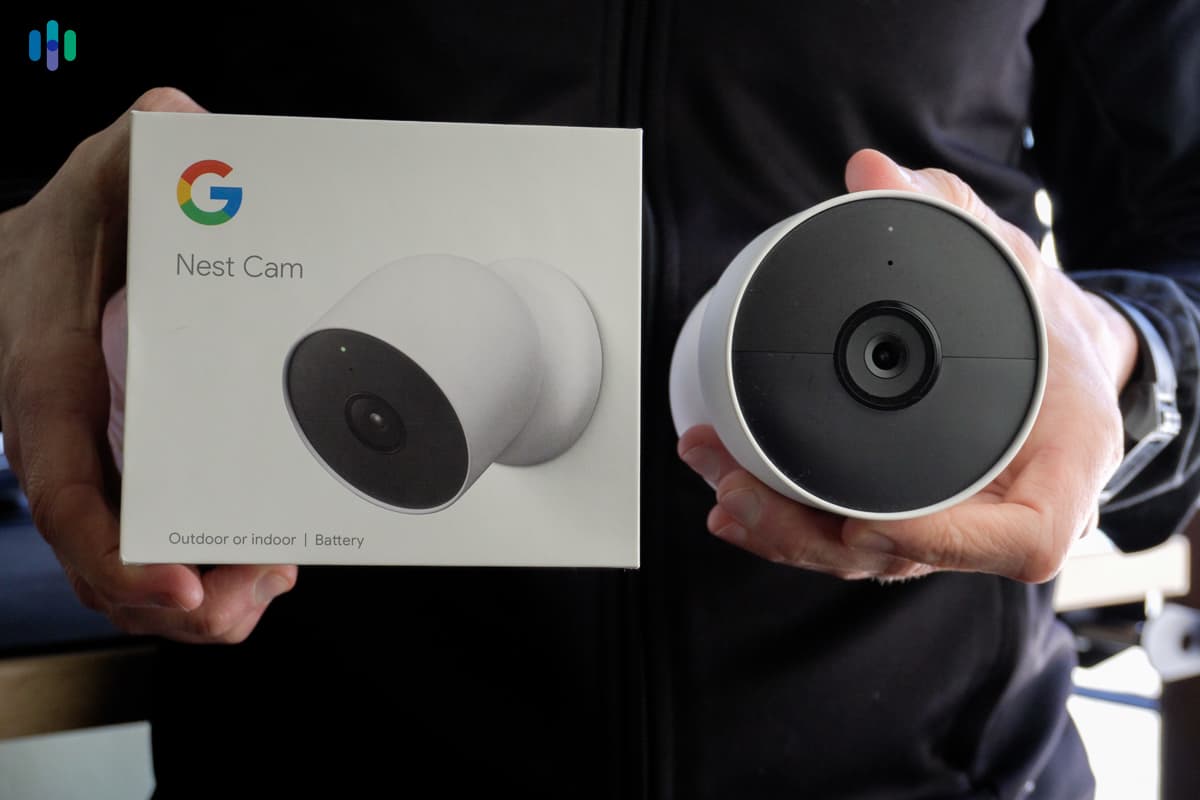
Should You Hide Your Security Camera?
You might be tempted to go full spy mode with cameras hidden in fake rocks, or tucked behind foliage. However, hidden cameras won’t deter crime. Studies consistently show that visible cameras make burglars reconsider their target. Hide them, and you’re essentially letting criminals walk right up to your door before they (maybe) notice they’re being recorded.
Pro Tip: Make sure that your security cameras are visible so that they can deter burglars from choosing your home to burgle.
How To Boost the Effectiveness of Security Cameras
Once you’ve placed your security cameras both inside and outside of your home, there are a few other steps you can take to deter crime even more.
Boost Security Cameras Effectiveness
- Signs and systems: Think of security like layers of an onion - each layer makes a burglar's job harder. A complete home security system with professional monitoring, visible yard signs, and audible alarms creates multiple deterrent points. Systems like those from Vivint combine all these elements into one comprehensive package.
- Visibility: We can't stress this enough - your security measures should be obvious. Mount cameras at eye level near entry points, place signs where they're clearly visible from the street, and ensure nothing blocks the view of your security equipment.
- Lights: Motion-activated floodlights can turn a burglar into a deer in headlights - literally. Many modern cameras like the Ring Spotlight Cam Battery combine cameras with built-in LED spotlights. They activate on motion, providing both illumination and color night vision recording.
- Sirens and voices: Today's smart cameras pack serious audio deterrents. Vivint security cameras, particularly the Vivint Outdoor Camera Pro, feature Smart Sentry AI that detects lurkers and responds with warning lights and sounds. Meanwhile, Deep Sentinel cameras include 104-decibel sirens (imagine a chainsaw next to your ear) that live guards can trigger remotely, combined with strobe lights for maximum deterrent effect.
- Night vision: Since many break-ins happen under cover of darkness, quality night vision is non-negotiable. Look for cameras with either color night vision (using ambient light or built-in lights) or infrared sensors. We prefer ones that can capture clear footage up to 30 feet away in complete darkness. Check out our tested picks for the best infrared cameras.
- Durability: Your outdoor cameras face everything from summer heat waves to winter storms. Check the operating temperature range (ideally -4°F to 113°F or wider). Also look for an IP65 rating or higher. That guarantees a dust-tight construction and protection against rain, snow, and even direct water jets.
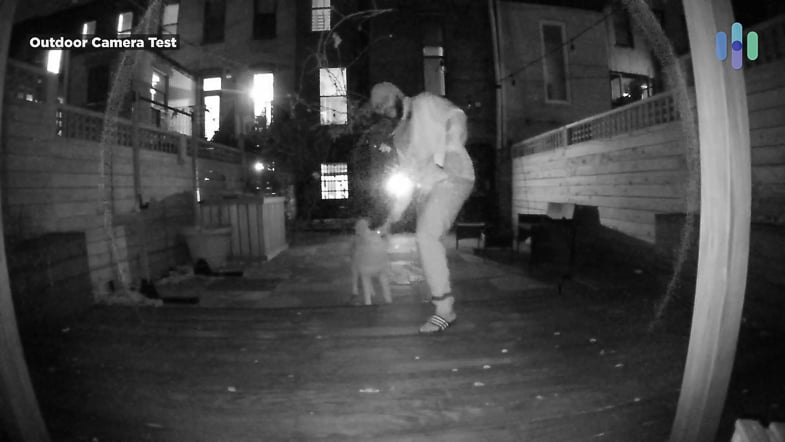
FYI: IP ratings measure how susceptible an object is to both solids and liquids. Look for a security camera with an IP rating of at least 65, meaning it’s dust-tight and resistant to low-pressure water jets.
Recap
The evidence is clear: security cameras deter crime, but they’re not magic shields. Studies show roughly half of burglars avoid homes with visible cameras, and entire neighborhoods benefit without simply pushing crime elsewhere. The key is using quality cameras as part of a complete security strategy. Visible placement, good lighting, alarm systems, and weather-resistant equipment all multiply their effectiveness.
Frequently Asked Questions
Still have questions about how security cameras and other deterrents work? Here are the answers to what homeowners ask us most often.
-
Do security signs deter crime?
Security signs do deter crime. In a study from the University of North Carolina, 25 percent of burglars said that security signs would deter them from choosing a house. However, signs are a less effective deterrent than security cameras and systems, which would deter 53 percent of burglars.
-
How do burglars choose houses?
Burglars choose houses based on a number of factors such as the presence of:
- Cars in the driveway, especially if they’re luxury
- Big fences
- Overgrown bushes or trees
- Old or cheap window frames and doors.
They also consider the proximity to other homes, preferring more isolated homes to burgle. This data comes from a survey of 86 inmates for burglary at the Oregon Department of Corrections from local television station KTVB7.
-
Do CCTV cameras deter crime?
Research from the University of North Carolina, Rutgers University, and the Urban Institute have found that CCTV cameras do deter crime.
-
Are cameras a good crime deterrent?
Cameras are a good crime deterrent, as 60 percent of most burglars will choose another target if they find alarms or cameras, according to a study from the University of North Carolina’s Department of Criminal Justice & Criminology.



